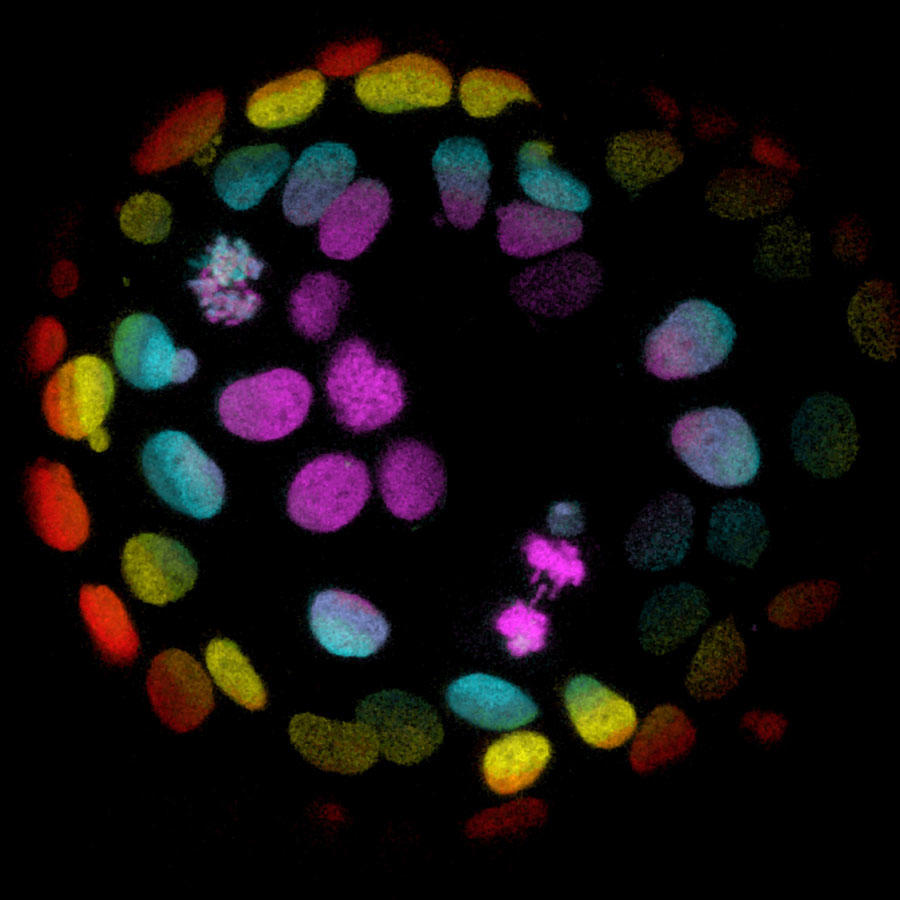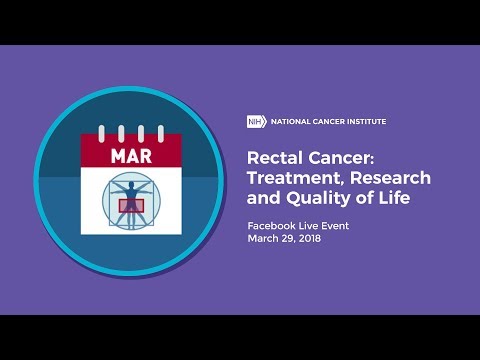07/11/2019 12:00 PM EDT
Advances in Colorectal Cancer Research
NCI-funded researchers are working to advance our understanding of how to prevent, detect, and treat colorectal cancer (CRC). They are also looking at what factors influence screening behaviors, how to address disparities, and the rising rates of CRC in younger people.
This page highlights some of the latest research in colorectal cancer, including clinical advances that may soon translate into improved care, NCI-supported programs that are fueling progress, and research findings from recent studies.
Prevention and Early Detection
Screening can reduce the risk of CRC through detection of precancerous growths, or polyps, before they become cancerous. It can also allow cancers to be detected early, before they cause symptoms and when treatment may be more effective. CRC screening tests include colonoscopy, sigmoidoscopy, stool-based tests, and virtual colonoscopy.
Despite the availability of effective CRC screening tests, some people choose not to get screened mainly due to the personal nature of the procedures, perceived costs, and the preparation involved for a colonoscopy.
Addressing barriers. To address these barriers, researchers are working to develop tests that are easier to use. In 2016, the Food and Drug Administration (FDA) approved a blood test (Epi proColon®) for CRC, but it is not yet known whether people who use that test have a reduced risk of dying from CRC.
Although not currently recommended for screening, there are new techniques under development such as:
- Finding technologies that improve the genetic analysis of stool samples, which may reveal the presence of tumor DNA.
- Looking at changes in the gut microbiome and trying to identify specific bacteria that could potentially help screen patients for CRC.
Repeat screening or follow-up. One concern about CRC screening is that some people don’t repeat screenings or follow up on abnormal test results. NCI is funding research to better understand how to increase the acceptance of repeat and follow-up screenings. Scientists are also studying the many levels of the healthcare delivery system and their effect on the decision to get screened.
Taking aspirin. Recent studies have shown that daily low-dose aspirin may prevent colorectal cancer. However, there are potential harms, particularly the risk of gastrointestinal bleeding. Aspirin is currently recommended by the US Preventive Services Task Force (USPSTF) to prevent colorectal cancer and cardiovascular disease in some individuals age 50 to 69. The NCI-sponsored study Aspirin Metabolomics in Colorectal Cancer Chemoprevention is seeking to identify blood and colon tissue substances that may play a role in the anticancer effects of aspirin.
Treatment for Colorectal Cancer
Surgically removing the cancer is the most common treatment for many stages of colorectal cancer. Chemotherapy, radiation, targeted therapy, radiofrequency ablation, and cryosurgery are other treatments that may be used to treat colorectal cancer, depending on the stage.
Because of an increased risk of recurrence and poorer prognosis, the treatment of rectal cancer may differ from that of colon cancer. Although surgery is the most common treatment for rectal cancer, advanced stages may also be treated with radiation, chemotherapy, targeted therapy, or active surveillance.
In addition to these standard treatments, researchers are continuing to study new treatments, such as immunotherapies, as well as new combinations of existing treatments, in clinical trials.
Immunotherapy for patients with Lynch syndrome
Approximately 5% of CRC cases are due to Lynch syndrome, an inherited DNA repair disorder. People with this disorder have a higher-than-normal risk of developing CRC, typically before they reach the age of 50. Lynch syndrome CRC tumors have many mutations, which may make them more susceptible to immunotherapies.
Indeed, the immune checkpoint inhibitors nivolumab (Opdivo), ipilimumab (Yervoy), and pembrolizumab (Keytruda) have been approved for the treatment of metastatic CRC in patients with Lynch syndrome. (They also have been approved for metastatic CRC in patients with microsatellite instability-high cancer (MSI-H).
Combining immunotherapy with other treatments for patients without Lynch syndrome
Immune checkpoint inhibitors have been less effective in the 95% of CRC patients without Lynch syndrome. Scientists are currently testing various agents, such as chemotherapy drugs, targeted therapies and viruses, in combination with immune-based therapy to determine whether combining treatments would be effective in killing cancer cells.
Testing targeted therapies for metastatic colorectal cancer
Using targeted therapies against genetic mutations that may be driving tumor growth is another key area of research for metastatic CRC. The goal is to find agents that can block the activity of the abnormal proteins produced by these mutations. For example, an NCI-supported trial showed that colorectal cancer that contains mutations in the BRAF gene responds to treatment with the drug vemurafenib (Zelboraf), which targets mutant B-Raf protein, when combined with cetuximab (Erbitux) (an anti-EGFR antibody) and irinotecan (Camptosar) (a chemotherapy drug).
Testing liquid biopsies
Liquid biopsies are a promising new approach being explored to detect, analyze, and track DNA, cells, and other substances shed from tumors into bodily fluids, such as blood and urine. Scientists are testing this method to detect CRC early, measure treatment responses, identify treatment resistance, and monitor for disease recurrence.
NCI-Supported Research Programs
See a full list of colorectal cancer research projects that NCI funded in FY 2017.
Many NCI-funded researchers at the NIH campus, and across the United States and world, are seeking ways to address colorectal cancer more effectively. Some research is basic, exploring questions as diverse as the biological underpinnings of cancer and the social factors that affect cancer risk. And some is more clinical, seeking to translate this basic information into improving patient outcomes. The programs listed below are a small sampling of NCI’s research efforts for colorectal cancer.
- NCI's Gastrointestinal (GI) SPOREs focus on translational research in the gastrointestinal system. Currently, GI SPOREs focus on cancers of the colon, rectum, esophagus, liver, gastrointestinal stromal tumors (GIST), and pancreas, which account for the majority of new diagnoses.
- The Population-Based Research Optimizing Screening through Personalized Regimens (PROSPR) is an NCI-supported network conducting research to better understand how to improve the entire cancer screening process (recruitment, screening, diagnosis, referral for treatment) for lung, colorectal, and cervical cancer in community healthcare settings.
- Accelerating Colorectal Cancer Screening and Follow-Up Through Implementation Science (ACCIS) is intended to promote research in colorectal cancer screening, follow-up, referral-to-care and best practices for how multilevel interventions can be scaled-up in regions of the United States where screening rates are below national standards.
- Approaches to Identify and Care for Individuals with Inherited Cancer Syndromes is a study to increase case ascertainment and appropriate follow-up care, optimizing the delivery of evidence-based healthcare for individuals at high risk of cancer due to an inherited genetic susceptibility.
- The goal of the Screen to Save Initiative, funded by NCI’s Center to Reduce Cancer Health Disparities, is to increase colorectal cancer screening in areas that need it most. Through community health educators, the program provides education and outreach to increase access to resources for those who may be affected by colorectal cancer.
- Dissemination of a Colorectal Cancer Screening Program Across American Indian Communities in the Southern Plains and Southwest United States is an effort to increase the use of colorectal cancer screening tests in American Indians. This project supports research on system-level changes and culturally appropriate media to promote screening, with the goal of closing the gap in colorectal cancer outcomes between the American Indian population and the general US population.
Clinical Trials
NCI funds and oversees both early- and late-phase clinical trials to develop new treatments and improve patient care. Trials are available for colorectal cancer screening, to prevent colon and rectal cancer, and treatment for colon cancer and rectal cancer.
Colorectal Cancer Research Results
The following are some of our latest news articles on colorectal cancer research:
- Studying Genes and Proteins Together Sheds New Light on Colon Cancer
- Could a Vaccine Prevent Colorectal Cancer in People with Lynch Syndrome?
- Immunotherapy Combination Approved for Colorectal Cancer
- Do Frequent Follow-Up Tests Help Colorectal Cancer Survivors?
- App Improves Colorectal Cancer Screening Rates
- Drug Combo Decreases Colorectal Polyps in People with FAP
View the full list of Colorectal Cancer Research Results and Study Updates.
























.png)












No hay comentarios:
Publicar un comentario